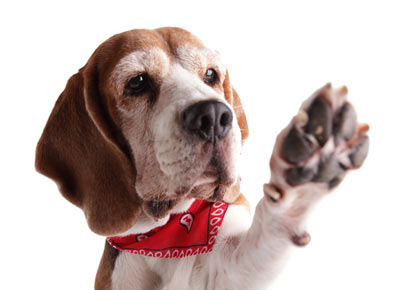Paw Pad Protection for Dogs

A dog's paw pads are often overlooked during routine care. These areas of extra-thick skin overtop of fat are tougher than normal skin, it's true, but they can still be injured and, if they are, they take longer to heal than many other injuries.
Here are some ways to protect your dog's paw pads all year long.
Hot Asphalt Can Injure Paw Pads
Walking or running on hot surfaces can burn your dog's paw pads. These burns are painful, prone to infection, and difficult to heal. Never run or walk your dog for long periods on hot surfaces, especially concrete or asphalt. If an area is too hot for you to walk with bare feet, it's too hot for your dog. You can learn more here: "Paw Pad Burns in Dogs."
Road Salt Can Harm a Dog's Paw Pads
Road salt is corrosive and can injure your dog's paw pads. He may also lick it off of his paws, and it is dangerous when ingested, too. Keep your dog off of salted areas when you can and make a habit of wiping his feet off when he comes in from walks, year-round. Learn more: "Cold Weather Tips for Dogs."
Paw Pads Can Be Injured by Extreme Cold
Frostbite is possible and common in dogs, especially on the extremities. Paw pads can become frostbitten, which results in tissue loss, pain, and sometimes infection. Limit your dog's contact with cold surfaces including deep snow to ensure that his feet and paw pads don't get too cold.
You may also consider dog booties to help protect your dog's feet during cold weather, but don't rely on them for long periods of time.
Paw Pads Are Prone to Cuts and Foreign Object Penetration
Because your dog's paw pads are constantly in contact with all kinds of different surfaces, they are prone to being injured. They can be torn, cut, or lacerated by sharp objects on the ground, including ice in the winter. Foxtails can get into them or between them into the foot, causing extreme pain and infection.
Your dog should be kept off of surfaces that look jagged or sharp, and you should examine your dog's paws after each walk to ensure that there is no injury or foreign object.
Harsh Floor Cleaners Can Injure Paw Pads
Beware of harsh floor cleaners and your dog's paws. Not only can walking on a floor recently cleaned with such a cleaner injure your dog's paw pads, but he is then likely to attempt to clean them off by licking, ingesting potentially toxic cleaner. Keep your dog off of recently cleaned floors, and consider rinsing the floor off with clean water and then drying it after you wash it.
Paw Pads Are Often Affected by Skin Diseases
Certain skin diseases like the autoimmune-induced pemphigus affect a dog's paw pads. In fact, sometimes that is the only area of a dog's body that shows signs of the illness. Pustules or cracked, raw, discolored or extra-rough paw pads may all be signs of an underlying skin issue.
Routinely Examine Your Dog's Paw Pads
Make it a habit to look at your dog's paw pads every day. Some things to watch for include:
- Cuts or lacerations
- Discolorations
- Rough areas
- Worn-down spots
- Redness or raised bumps
If you see anything unusual while looking at your dog's paw pads, make an appointment with your veterinarian right away.
You May Also Like These Articles:
How to Make Canned Food into Treats for Your Dog
General Tips for Keeping Your Dog Safe
First Aid for Dogs: An Overview
Handling and Transporting a Sick or Injured Dog
Disclaimer: This website is not intended to replace professional consultation, diagnosis, or treatment by a licensed veterinarian. If you require any veterinary related advice, contact your veterinarian promptly. Information at DogHealth.com is exclusively of a general reference nature. Do not disregard veterinary advice or delay treatment as a result of accessing information at this site. Just Answer is an external service not affiliated with DogHealth.com.
Notice: Ask-a-Vet is an affiliated service for those who wish to speak with a veterinary professional about their pet's specific condition. Initially, a bot will ask questions to determine the general nature of your concern. Then, you will be transferred to a human. There is a charge for the service if you choose to connect to a veterinarian. Ask-a-Vet is not manned by the staff or owners of DogHealth.com, and the advice given should not delay or replace a visit to your veterinarian.



